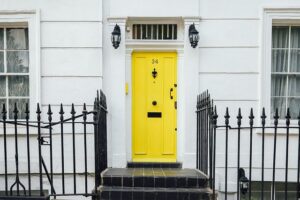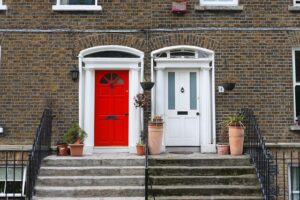 A key step in improving the security of your home is your front door. As the main entry to your house, it’s often the first thing any criminals will target when trying to enter your property. The good news is, there are now plenty of front door security considerations you can think about installing to keep your house safe.
A key step in improving the security of your home is your front door. As the main entry to your house, it’s often the first thing any criminals will target when trying to enter your property. The good news is, there are now plenty of front door security considerations you can think about installing to keep your house safe.
Feeling safe is regarded as a basic human need. However, making sure our homes are secure is a big task. How safe you feel in your home depends on a few factors, such as the neighbourhood you live in; past experiences; and crime rates in your area. Knowing you are safe in your home is equally as important as feeling like your family and possessions are secure while you’re away.
Equipping your home with quality safety features can have additional benefits alongside extra security. If you have home or contents insurance, your extra-secure door can help lower the costs involved.
Here’s our guide to upgrading the safety of your house by choosing a secure front door.
Single-Point Door Locking Systems
Front door locks come with varying levels of security depending on the type of lock, and it can be difficult to decide which is best for you. There is a lot to consider, from choosing between a single- or double-cylinder lock, to whether a standard latch with a spring bolt is enough. Or, are you going to require an additional dead bolt?
From there, it comes down to what you feel is required to make you feel secure, as there are a number of security options included with these types of locks. These options include:
- Nightlatch
A low security option, the nightlatch is a spring lock that is opened from the inside or outside by engaging the lever set with a key. They lock automatically when you pull the door closed unless the latch is held back by a small button (snib). This lock is typically part of a multi-point system, as opposed to being the sole lock.
- Five-lever mortice deadlock
Often only seen now on older wooden front doors and porch doors, the five-lever mortice deadlock uses a key to move the levers within the lock into the correct position. The lock sits within the door itself and is designed to make lock picking or drilling more difficult. These locks are often paired with the nightlatch for additional security, as opposed to being the only lock on the door.
- British Standard BS 3621 deadlock
A standard of lock by the British Standards Institute for thief resistant locks, the BS3621 is a more secure variant of the five-lever mortice deadlock. It can only be opened by the key both inside and out and has a reinforced deadlock and hardplates to protect from drilling.
- Cylinder lock
Fitted into the door, the cylinder lock is a higher security level option where the keyhole and pin-and-tumbler system are within a cylinder or barrel within the door. The lock uses different length pins, so that only the matching key can unlock it. Some locks are even being magnetised to raise the pins as opposed to lowering them – making lock picking even less unlikely.
While designed to meet the British Standard TS007:2014 some older variations of the cylinder lock can be vulnerable to lock picking or snapping. They may therefore need pairing with a security handle or cylinder guard to reach optimum security standards.
Multi-Point Door Locking Systems
If you’re looking for the best security, a multipoint locking system is definitely best. This involves a number of bolts and hooks around the frame which are employed by lifting the handle. The two most common types are three point and five-point system.
- Three-point systems come with a standard combination latch and deadbolt in the middle of the door, with an additional two hook bolts at the top and bottom of the frame.
- Five-point systems have the same but with a further two additional locking points around the frame. The system allows for all locks within it to lock and unlock simultaneously with the turning of the key, and is a popular choice compared to the single point locks described above.
Pick a Secure Window

t door locks come with varying levels of security depending on the type of lock, and it can be difficult to decide which is best for you. There is a lot to consider, from choosing between a single- or double-cylinder lock, to whether a standard latch with a spring bolt is enough. Or, are you going to require an additional dead bolt?
While a door without a window may seem more secure, people often select doors with windows – or even fully glass doors – for aesthetic reasons. Depending on the design of your house, a glass door might be the option that looks best. Glass doors also let more light into the home, brightening up your entrance and giving you a view of the outside world. However, there are security issues to think about if you’re looking to ensure your front door is safe.
Here are some of our tips on how to improve the security of glass doors and or doors with windows.
Make Sure it’s Double Glazed
There are many benefits to double glazing from a security perspective. Advancements in technology mean that where double glazing may have lacked in security in the past by creating a point of vulnerability, modern windows can now increase security due to the added strength.
The beading previously used on the exterior of the fixing to hold double glazing in place has since been tucked neatly within the interior of the fixing. This makes it next to impossible for the burglar to remove the glass from the outside.
With most modern double glazing being capable of withstanding a brick or stone thrown at it, it is unlikely a burglar will be making an entrance without drawing far too much attention.
Here at C2C, we specialise in the fitting of double glazing to enhance security in the home. Whether that’s your windows or doors, we keep both your home and financial security in mind. At a competitive price, our engineers can install, repair, or replace the double glazing on your door so that you can maintain security and feel safer.
Consider Reinforced Windows
Reinforced glass, as implied by its name, is stronger than the standard home window glass and comes in a variety of types. The most commonly used in homes are tempered or laminate glass. Not only can the added strength help deter break ins, but also many forms of reinforced glass do not shatter into shards, making them safer if any damage did occur.
Tempered glass is four to five times stronger than average glass. It’s the most inexpensive security glass, with additional safety measures. Again, when tempered glass shatters, it breaks into small oval shapes as opposed to sharp shards. This is especially important if you have young children or pets.
Laminate glass is made of two or more pieces of glass bonded with plastic and is impact resistant. In fact, it is often used in areas prone to natural disaster – such as costal homes or homes located on fault lines. The plastic allows it to remain within the frame, as opposed to shattering into thousands of pieces if it does break.
Think About Window Placement & Security
‘Reach around’ tactics mean burglars are able to unlock your door from the inside after breaking your windowpane. Make sure your lock is well-placed, so it can’t be opened if someone does manage to smash your front door window.
Strong Hinges
Hinges can often be a point of weakness that intruders will look to exploit, hence why the quality and placement of your hinges is crucial in maintaining security. Out-swinging doors in which the hinges are exposed to the outside can be of issue due to the ease of access for burglars. It’s useless having a good lock and secure door if it can just be removed from its hinges! If the hinges are already damaged, worn, or of poor quality, entry becomes even easier.
If this is the case, it may be best to replace your door hinges with stronger security hinges, allowing not only for the replacement of old damaged hinges but also combatting the flaws of the outward swinging door.
Interlocking security studs in a security hinge work to lock the leaves of the hinge together, preventing the door being lifted off its hinges. A secured hinge pin means there would be no way for the intruder to knock the pins out and again, take the door from its hinges.
Cloudy2Clear can help with broken doors and windows. While many companies request the replacement of the entire window or door to achieve this, we replace just the broken part instead.
Strong Handle
One of the weakest parts of the door and lock, the handle is where intruders are most likely to begin with their attempt to enter your home. There are a number of ways to exploit this weakness, so ensuring your handles are in the best condition they can be – and are reinforced – can help protect the door lock components from picking or snapping.
Some features of a strong door handle include:
- Hardened metal body and bolts– this protects from the hardships of both simple wear and tear over time, and the brute force of any potential intruders.
- Cylinder guards– sitting underneath the external handle, the cylinder guard protects the cylinders of the lock from snapping should the handle be removed.
- Anti-drill rotating disk shield – protects the barrel from being drilled.
Keep Your Home Secure with Cloudy2Clear
Making sure your home is safe is a practical way to achieve peace of mind. By selecting a decent front door that keeps your family and possessions secure, you’re taking sensible steps to improve your home – and your safety. This can help alleviate those everyday worries surrounding the security of your house.
Once you have your security features installed, the key is to then keep them well maintained. This prolongs the quality of your doors and windows, ensuring your home remains safe for years down the line. Any worn down or broken parts can lead to defects in your safety features, so it’s important to check them regularly for signs of wear and tear.
At Cloudy2Clear, we specialise in repairing and installing quality double glazing for windows and doors. We work with our clients to make sure our developments leave them feeling safe in their homes. Our expert repair services for locks, handles, and hinges are also a popular choice for those looking for reassurance and security.
To get in touch and discuss how we can help, fill out our online contact form now. You can also give us a call on 0800 61 21 119.
